Introduction #
The author of the Oil Storage Tanks dataset recognize the significant role played by oil storage tanks in the global economy. These tanks serve as crucial points for the storage of crude oil throughout various stages, from extraction to eventual sale. Additionally, nations utilize storage tanks to create reserves of oil, and the volume of oil held in these tanks serves as a vital economic indicator. It offers insights into the production trends of oil-producing nations and provides a window into the worldwide demand for energy resources. However, it’s essential to note that information related to oil storage is often not transparent, as nations may withhold data concerning oil production, consumption, and storage for various economic or military reasons. To address this issue, companies such as Planet and Orbital Insight have undertaken the task of collecting satellite imagery of oil storage tanks and estimating the volumes of reserves.
The estimation of tank volumes is made feasible due to the prevalent use of floating head tank in storing oil. These tanks feature a head that directly rests on top of the crude oil, preventing the accumulation of fumes. Consequently, the height of the tank head fluctuates in correspondence with the volume of oil contained within the tank. Analysts can utilize the relative dimensions of the exterior shadow cast by the tank and the interior shadow created by the height of the tank head to make estimations regarding the tank’s volume.
Within this dataset, satellite images sourced from Google Earth depict industrial areas worldwide, specifically those housing oil tanks. These images come with annotations that include bounding box information pinpointing the locations of floating head tanks within the images. Notably, fixed head tanks remain unannotated.
In the large_images directory, you will find the original 4800x4800 images directly obtained from Google Earth. These files follow the naming convention id_large.jpg.
The image_patches directory contains 512x512 patches extracted from the larger images. Each large image is divided into 100 patches of size 512x512, with an overlap of 37 pixels along both axes. These patches are named id_row_column.jpg.
Summary #
Oil Storage Tanks is a dataset for an object detection task. Possible applications of the dataset could be in the oil & gas and logistics industries.
The dataset consists of 10100 images with 5820 labeled objects belonging to 1 single class (floating head tank).
Images in the Oil Storage Tanks dataset have bounding box annotations. There are 8505 (84% of the total) unlabeled images (i.e. without annotations). There are 2 splits in the dataset: image_patches (10000 images) and large_images (100 images). The dataset was released in 2019.
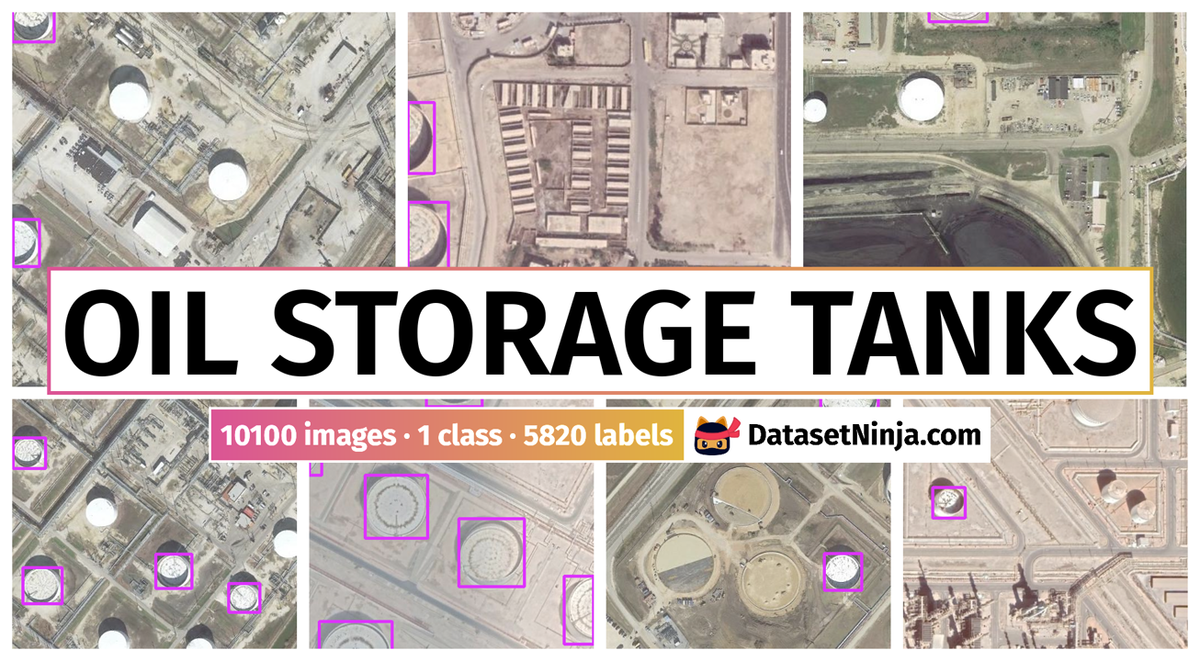
Explore #
Oil Storage Tanks dataset has 10100 images. Click on one of the examples below or open "Explore" tool anytime you need to view dataset images with annotations. This tool has extended visualization capabilities like zoom, translation, objects table, custom filters and more. Hover the mouse over the images to hide or show annotations.

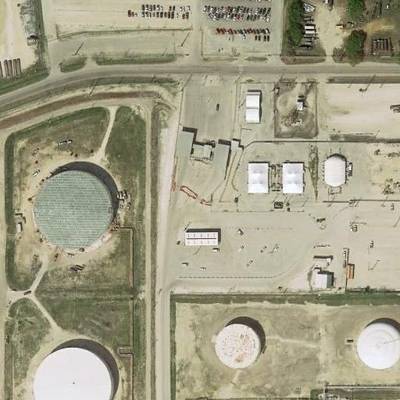

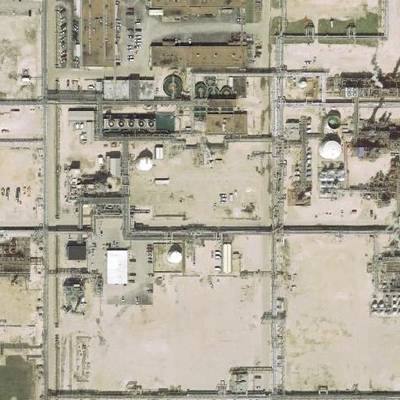

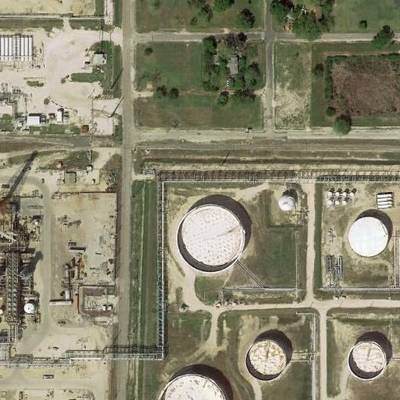

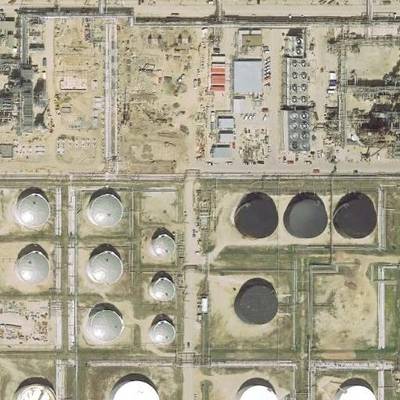

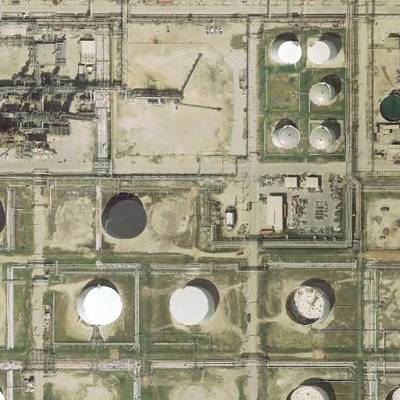

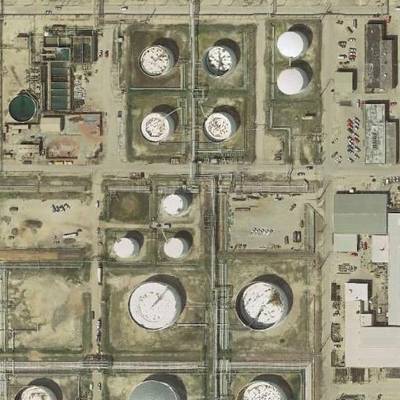

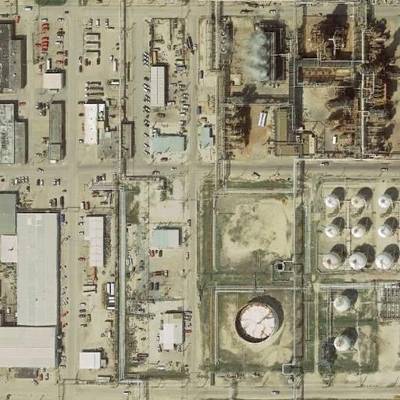

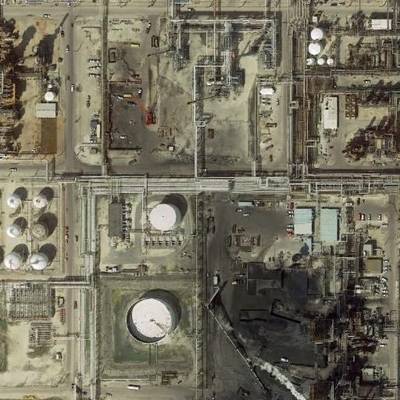



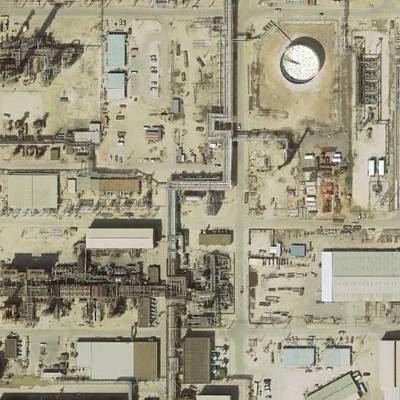

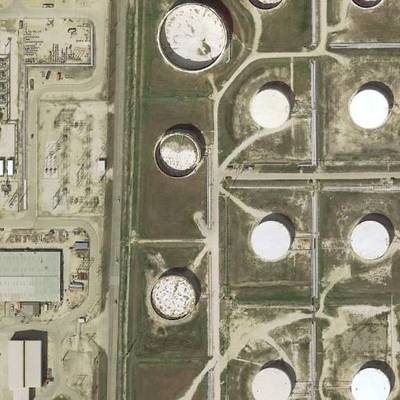

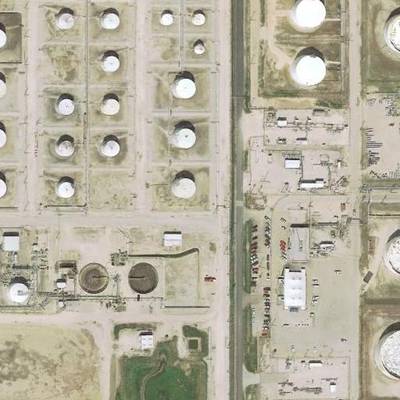
Class balance #
There are 1 annotation classes in the dataset. Find the general statistics and balances for every class in the table below. Click any row to preview images that have labels of the selected class. Sort by column to find the most rare or prevalent classes.
Class ㅤ | Images ㅤ | Objects ㅤ | Count on image average | Area on image average |
|---|---|---|---|---|
floating head tank➔ rectangle | 1595 | 5820 | 3.65 | 7.34% |
Images #
Explore every single image in the dataset with respect to the number of annotations of each class it has. Click a row to preview selected image. Sort by any column to find anomalies and edge cases. Use horizontal scroll if the table has many columns for a large number of classes in the dataset.
Object distribution #
Interactive heatmap chart for every class with object distribution shows how many images are in the dataset with a certain number of objects of a specific class. Users can click cell and see the list of all corresponding images.
Class sizes #
The table below gives various size properties of objects for every class. Click a row to see the image with annotations of the selected class. Sort columns to find classes with the smallest or largest objects or understand the size differences between classes.
Class | Object count | Avg area | Max area | Min area | Min height | Min height | Max height | Max height | Avg height | Avg height | Min width | Min width | Max width | Max width |
|---|---|---|---|---|---|---|---|---|---|---|---|---|---|---|
floating head tank rectangle | 5820 | 2.01% | 13.41% | 0.11% | 10px | 1.95% | 187px | 36.52% | 68px | 13.32% | 11px | 2.15% | 188px | 36.72% |
Spatial Heatmap #
The heatmaps below give the spatial distributions of all objects for every class. These visualizations provide insights into the most probable and rare object locations on the image. It helps analyze objects' placements in a dataset.
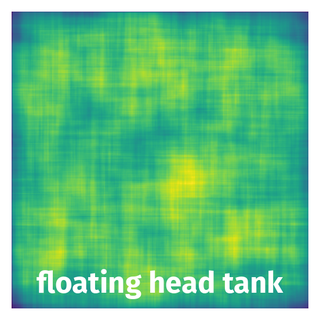
Objects #
Table contains all 5820 objects. Click a row to preview an image with annotations, and use search or pagination to navigate. Sort columns to find outliers in the dataset.
Object ID ㅤ | Class ㅤ | Image name click row to open | Image size height x width | Height ㅤ | Height ㅤ | Width ㅤ | Width ㅤ | Area ㅤ |
|---|---|---|---|---|---|---|---|---|
1➔ | floating head tank rectangle | 96_6_5.jpg | 512 x 512 | 117px | 22.85% | 59px | 11.52% | 2.63% |
2➔ | floating head tank rectangle | 94_5_2.jpg | 512 x 512 | 133px | 25.98% | 59px | 11.52% | 2.99% |
3➔ | floating head tank rectangle | 20_0_4.jpg | 512 x 512 | 96px | 18.75% | 102px | 19.92% | 3.74% |
4➔ | floating head tank rectangle | 20_0_4.jpg | 512 x 512 | 96px | 18.75% | 67px | 13.09% | 2.45% |
5➔ | floating head tank rectangle | 02_6_1.jpg | 512 x 512 | 41px | 8.01% | 41px | 8.01% | 0.64% |
6➔ | floating head tank rectangle | 02_6_1.jpg | 512 x 512 | 82px | 16.02% | 96px | 18.75% | 3% |
7➔ | floating head tank rectangle | 02_6_1.jpg | 512 x 512 | 83px | 16.21% | 95px | 18.55% | 3.01% |
8➔ | floating head tank rectangle | 02_6_1.jpg | 512 x 512 | 88px | 17.19% | 56px | 10.94% | 1.88% |
9➔ | floating head tank rectangle | 14_0_3.jpg | 512 x 512 | 59px | 11.52% | 56px | 10.94% | 1.26% |
10➔ | floating head tank rectangle | 14_0_3.jpg | 512 x 512 | 59px | 11.52% | 57px | 11.13% | 1.28% |
License #
License is unknown for the Oil Storage Tanks dataset.
Citation #
If you make use of the Oil Storage Tanks data, please cite the following reference:
@dataset{Oil Storage Tanks,
author={Karl Heyer},
title={Oil Storage Tanks},
year={2019},
url={https://www.kaggle.com/datasets/towardsentropy/oil-storage-tanks}
}
If you are happy with Dataset Ninja and use provided visualizations and tools in your work, please cite us:
@misc{ visualization-tools-for-oil-storage-tanks-dataset,
title = { Visualization Tools for Oil Storage Tanks Dataset },
type = { Computer Vision Tools },
author = { Dataset Ninja },
howpublished = { \url{ https://datasetninja.com/oil-storage-tanks } },
url = { https://datasetninja.com/oil-storage-tanks },
journal = { Dataset Ninja },
publisher = { Dataset Ninja },
year = { 2026 },
month = { feb },
note = { visited on 2026-02-20 },
}Download #
Please visit dataset homepage to download the data.
Disclaimer #
Our gal from the legal dep told us we need to post this:
Dataset Ninja provides visualizations and statistics for some datasets that can be found online and can be downloaded by general audience. Dataset Ninja is not a dataset hosting platform and can only be used for informational purposes. The platform does not claim any rights for the original content, including images, videos, annotations and descriptions. Joint publishing is prohibited.
You take full responsibility when you use datasets presented at Dataset Ninja, as well as other information, including visualizations and statistics we provide. You are in charge of compliance with any dataset license and all other permissions. You are required to navigate datasets homepage and make sure that you can use it. In case of any questions, get in touch with us at hello@datasetninja.com.


